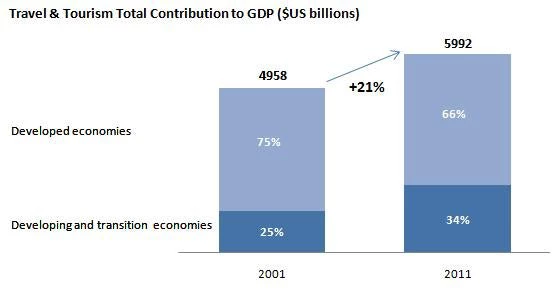When most people think of tourism, they think about a vacation to a new destination, an island retreat, a beautiful vineyard, or a hike in the mountains. They rarely think of tourism as a source of inclusive poverty reduction in the developing world.
Nkwichi Lodge in Mozambique is a good example. Investments to the projects created 75 jobs for locals supporting over 1,000 community members. It also established a community trust that built five local schools, a maternity clinic and a maize mill that provided nutrition and education to more than 350 farmers and their families. This is having a transformative impact on poverty reduction and improvements in the quality of life of some of the worlds poorest.
The potential of the tourism sector
The tourism sector is one of the priority sectors of the Investment Climate Advisory Services for investment generation and regulatory simplification. We and institutions like UNCTAD, as well as the World Economic Forum strongly believe this sector can boost competitiveness , expand economic opportunity and provide a pathway to prosperity in client countries. Unsurprisingly, developing economies like Haiti, Mozambique, the Solomon Islands, Yemen and Zambia recently prioritized tourism as a key target to produce economic growth.
But what makes the tourism sector so attractive?
While the answer is not 100 percent clear, it is clear that the tourism sector is growing and in particular in developing in transition countries. Its total contribution to global GDP has grown by 21 percent in the last decade to$5,992 billion in 2011 (Figure 1).
Source: World Travel and Tourism Council (WTTC) 2011
The tourism sector has strong links to economic growth.
Economic (GDP) growth is of principal concern for all countries, particularly those engaged in poverty reduction as a means to spread wealth across the population. Empirical studies in countries as diverse as Barbados, Croatia, India, Taiwan and Turkey have shown a causal relationship between tourism development and economic growth. A cross country study by the IMF showed that an increase of one standard deviation in the share of tourism in exports leads to about 0.5 percentage point in additional annual growth, everything else being constant. Thus many governments (particularly low income economies) should view investing in its tourism industry as a means to stimulate growth over the long term and enabling the poor to share in economic gains.
Tourism investments can benefit local people
Tourism is one of the only industries in the world where the ‘good’ or ‘service’ is consumed at the site of production. For this reason, local people are both at an advantage to reap the benefits associated with the sector, but also at risk from exclusion or even the negative impacts it can bring. A well planned, regulated and responsible tourism can be an excellent mechanism of channeling resources from rich to poor - even at the large scale. Commercial tourism activities provide an opportunity for local people to participate in direct employment, in providing goods and services to tourism businesses through the supply chain, but also in direct interaction with the tourist (for example: crafts, excursions, food and beverage). The generation of earnings amongst those local people directly involved with the industry in turn stimulates indirect spend (of wages) in the local economy.
Tourism provides opportunities for economic diversification and skills upgrading
Developing countries can leverage tourism to support local companies and entrepreneurs in developing new products and exports. The tourism sector provides a means by which local entrepreneurs can experiment with new products and test them on international markets in their home country before exporting. International tourists typically create demand for products and services which may not have already existed in the local market and also demand certain quality standards. Whilst these can be a challenge to meet in the short-term, tourism creates the market and the incentive to drive the process – leading to growth and improvement over time.
Sustainably protecting environmental and cultural assets
Many developing countries have rich natural or cultural heritage assets such as national parks, coral reefs, rare species, ancient cities or monuments that are under threat. Often, states do not have the financial resources to allocate to the preservation of these areas and more creative ways of funding their protection must be sought. The revenue generated from tourism is one such solution – provided it is regulated and managed in a responsible manner.



Join the Conversation